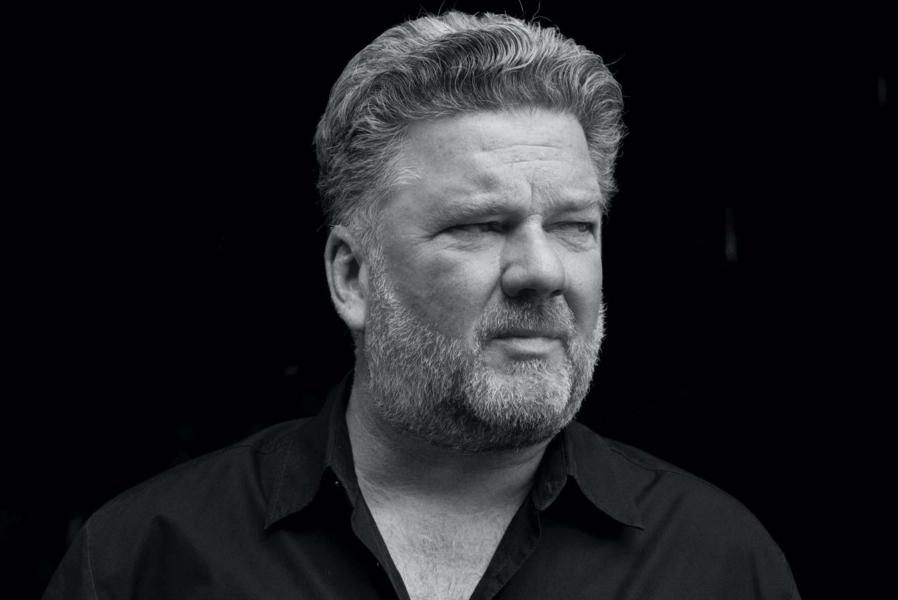POLE
Booking: info(@)folkwisdom.net
“Pole’s groundbreaking 123 trilogy […] should be mandatory in all collections of modern music” – THE WIRE
“[Tempus] is a keenly executed multimedia project that revels in its sharp vision for the future.” – TREBLEZINE
“Betke’s music at its lushest, with curling synthesizers providing a dense undergrowth where static makes merry” – THE NEW YORKER
In 2022 the Düsseldorf-native musician, producer, remixer and mastering engineer Stefan Betke looks back on a steady 24-year career in abstract electronic club music. In particular, the 8 albums that he released during this period under the Pole moniker have lastingly shifted the coordinates of electronica.
Beginning with his dark blue debut album “1” from 1998, Pole laid a foundation of bass, dub and a defective pole filter as the point from which to explore and implement new sonic architectures. Up until the turn of the millennium, these expeditions grew into a trilogy of albums entitled “1”, “2” and “3”, appearing in the colors blue, red and yellow. The three albums are now considered milestones of electronic music. Reissued by Mute in 2020 to celebrate the 20th anniversary, the trilogy reaffirmed its game-changing status in contemporary music. In their 5* review, The Observer called it “calming, abstract, minimal genius.”
In 2007 pole released his album “Steingarten” on ˜scape Records. This was the first release on Pole´s own imprint and inspired by long walks through various forests. The compositions “Wald” (2015) do not deny their inheritance within the continuum of dub, yet they bring an entirely new vocabulary to Pole’s sonic and spatial universe.
Although it was with the now-legendary, defective Waldorf 4-Pole filter that Pole initially realized his signature sound, over the years Pole emerged as a sonic architect who increasingly drew from internal sources – finding inspiration in the city as well as in nature.
The urban canyons of New York or the broad avenues of Berlin, the mountains and valleys with their echoes, the meditative forests, the above, below and beyond, as well as the horizon – offset by the verticals of trees and buildings – became a sort of matrix for Pole, within which he could hone a very specific poetry of reverberation with unmatched virtuosity.
Pole increasingly presented this through live performances, in which the elements of improvisation and the erratic development of his own music played an equally constant and central role. With the precision of a structural engineer and the confident intuition of one who can hear sound where previously there was silence, Pole goes to the concrete cellars, open-air stages and nightclubs in his path and busts them open from the inside out.
At the same time, Pole has always been open to various shorter and longer term collaborations with other musicians, such as Four Tet, Roll The Dice or the American rapper Fat Jon. Throughout these various collaborations, Pole has maintained a head-on approach to the discourse at hand – permanently refocusing a restless mind.
2020’s acclaimed album “Fading” (Mute) was about coping with dementia and the loss of memory over time. A concept album this is not however. The role of memory loss and his mother was simply a springboard for Betke, an idea to further explore through sound. Pole’s music has always been multifaceted, blurring lines, genres, tones and “Fading” is no different.
Betke’s follow up, “Tempus” (out on Mute on Nov 18, 2022), is an album that considers the connection between the past, present and future. It’s a natural topic to explore, not only because of the connection it clearly has with the themes explored on “Fading”, but because all of Pole’s work has an interconnectedness that spans past, present, and future. While each Pole album – his catalogue glides across ambient, dub, jazz, glitch, and electronica – is distinctly singular in its own right, the albums are part of an ongoing evolution that link as much to history as they do to the future.
As ever, the presence of dub within Betke’s idiosyncratic framework of electronic music, is a constant. However, its function perhaps takes on a more significant role in the context of this record. The dub effect units used in Pole’s music delay sound, keeping them a step behind the present before they are released and then they fade away again into a foggy reverb. The pace, tone and echo of dub effects are themselves traversing the essence of past, present and future within the album. It’s also one of the most overtly jazz-leaning records in Betke’s career. However, given his inclination to do things originally, it’s a kind of deconstructed, mutated and manipulated form of jazz.
Pole’s ongoing musical evolution, while retaining a relationship to previous work, means that he is already naturally building an ever-stronger bridge between the present and the past. However, the deeply innovative sounds that he continues to carve and explore, and always breaking new ground with each record, means that bridge is also being extended far into the future.
Following the musical development for his latest album, Pole created a new live concept and joint ventured with Rainer Kohlberger on visuals by performing 2 highly acclaimed A/V shows at Unsound Festival in Krakow and Mira Festival in Barcelona.

